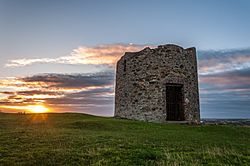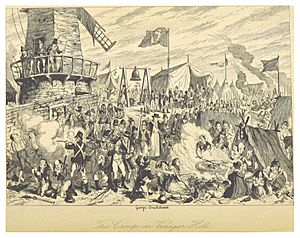Vinegar Hill Windmill facts for kids
Quick facts for kids Vinegar Hill Windmill |
|
|---|---|
 |
|
| Origin | |
| Mill name | Vinegar Hill Windmill or Templeshannon Windmill |
| Coordinates | 52°30′05″N 6°33′12″W / 52.50147°N 6.5532°W |
| Year built | 1600–1798 |
| Information | |
| Purpose | Corn mill |
| Type | Tower mill |
| Storeys | Three storey tower |
| No. of sails | Four |
| Type of sails | Common sails |
The Vinegar Hill Windmill, also known as the Templeshannon Windmill, is a special type of building called a tower mill. You can find it on Vinegar Hill in County Wexford, Ireland.
What is the Vinegar Hill Windmill?
The Vinegar Hill Windmill is a small, round windmill. It was built sometime between the years 1600 and 1798. This old building sits on high ground, giving it a great view of the area. It is made from bricks and carefully cut stones.
Why is the Windmill Important to History?
This windmill played a big role in the 1798 Rebellion. During this time, Irish rebels fought against British forces. The windmill was used as the main meeting place and command center for the rebels. They even flew their flag from the top of the windmill!
However, on June 21, 1798, the rebels were defeated by General Gerald Lake. After their defeat, the rebel flag was taken down. In its place, the English Royal Standard was raised. This marked the end of the battle on Vinegar Hill.
What is the Windmill Used for Now?
The Vinegar Hill Windmill has been in ruins for a very long time, even before 1840. It probably stopped being used after the 1798 Rebellion. Today, it is recognized as an Irish National Monument. This means it's a protected historical site.
In the 1960s, the windmill started to fall apart even more. People were upset about this. Someone even put up a sign to protest! The sign pointed out that the British government had taken care of the windmill for many years. But after Ireland gained its freedom, the Irish Office of Public Works seemed to neglect it.
Today, the windmill is part of the larger National 1798 Rebellion Centre. This center helps people learn about the 1798 Rebellion. The windmill stands as a reminder of the important events that happened on Vinegar Hill.
 | Aurelia Browder |
 | Nannie Helen Burroughs |
 | Michelle Alexander |


